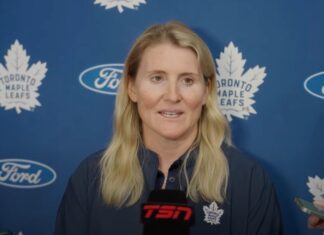General Manager Kyle Dubas joined Prime Time Sports on Friday evening, going in-depth on his relationships with Mike Babcock, Lou Lamoriello and Mark Hunter, the role of analytics in the Leafs’ decision-making process, and much more.
When you go into a restaurant before today, are you generally recognized?
Dubas: Depends on where the restaurant is. If it’s close to Air Canada Center on a game night, yes. If not, no. If it’s in Sault Ste. Marie, yes.
That is all about to change. You understand that now?
Dubas: We do.
How close did you come, if at all, to leaving last year?
Dubas: I think the process never got to the point where it was an actual decision. It was an idea and considered. Brendan made the call that I was going to be staying. Here we are.
Did he make you any promises at that time?
Dubas: Not at that time, no.
You have to potential – if not the opportunity – to take the job in Colorado, and your President stands in the way of that. Did it piss you off?
Dubas: I think in the short term, you have an opportunity, and you have tried to work towards that, but after the initial discussion with Brendan and kind of getting over that, I just said, “You can look at it and feel sorry for yourself, or you can get to work on the season ahead with the Maple Leafs.” I think that’s really where my relationship with Lou was a big benefit, in leaning on Lou during that and leaning on Lou during the year to help improve myself and thus help improve the hockey club.
How did your relationship with Lou change over the course of the last three years? Rocky might not be the right word, but you had to grow into it.
Dubas: It was certainly never rocky. I think from the outset, and I’d put the blame to myself, Lou came into the organization and I had been here. I think I could’ve been better in the first part of the first season, and maybe the whole first season, at learning as much as I possibly could from Lou and not being stubborn or fixated on my way. As I reflected after the first season, it was clear to me that I was leaving a lot on the table that I could be taking from Lou’s mentorship. It was never, ever rocky. Maybe partially because of age or the way we look and operate, it’s an easy thing for people to say, but it was never rocky. I know it was reported, and he and I would kind of laugh about it. We’ve always had a very good relationship and it’s become a great one that I am very appreciative of.
Where is the common ground between the two of you? Generationally, you’re far apart. You come at hockey at different times with maybe different approaches. Where did the circles intersect between the two of you?
Dubas: From a non-hockey perspective… primarily, when I saw the way that Lou treated people and treated my family and treated me personally, you grow an appreciation for someone who is in that role and leading and how they treat you personally, and I think, more importantly, how they treat your family. Aside from hockey, we have a connection over baseball and we talk a lot about baseball. I think, in the end, we both love hockey. Whether we come at it from different eras or time frames, that was the key point. Systems of how you run an organization, how you treat people — all of that, I think, was the key. And we developed a really good personal relationship – not just as it pertained to hockey, but for me, how to handle myself out of hockey, treating people, how to handle the media, how to handle the various different elements. That will always be of huge importance to me as I move ahead.
You spoke the same language, or did it take time to figure out that you actually did speak the same language?
Dubas: I don’t think we ever spoke precisely the same language. The thing that really evolved is, when we had a difference in how I thought things were versus Lou had thought for a long time, it just created good discussion. I think you know you’re getting to a good relationship point with somebody when you can have a difference in ideas and walk away from it and never really worry that it is going to impact your relationship long term. You’re all trying to reach the same goal, which is to help the Maple Leafs. I think, for me, that was the major thing for Lou that I gained – the bringing in of different ideas and how to put them all together to best help the Maple Leafs.
When did Brendan tell you he wanted to be the GM?
Dubas: Wednesday he brought me in and told me.
Have you talked to Lou since you got the job?
Dubas: I’ve talked to Lou throughout the process.
Since Wednesday?
Dubas: Oh, yeah. I talked to Lou twice Wednesday. I think three times yesterday. He and I have been texting all day today. Continual contact with him.
Can we now lead that to mean that your senior advisor will be an active member of your group?
Dubas: For me, yes. Lou will always be an active member regardless. It could be ten years from now and Lou will always be, to me, an active member in my life, hockey or otherwise. Right now, in his role, absolutely.
When Lou’s change in job was announced, Brendan said this was the timeline all along – that this was how the timeline was structured and he was going to do this many of years as a GM and then become an advisor. Did you know that was the timeline?
Dubas: I had a very general sense that they had discussed it. We had talked about it last Spring. But I didn’t know the exact specifics of it. I think Lou has always been very good with me preparing me for whatever it was going to be to be able to take those necessary steps.
You didn’t know that this was going to happen at the end of the season?
Dubas: Not for certain, no.
When did you tell your grandmother?
Dubas: Last night, I called her. Those are important calls. I think that’s when you realize the importance of what you’re doing and what it means to the other people who have been on the journey with you as you get their reaction.
She was pumped, but her focus is back to the Soo game tonight right away.
It was widely speculated that either you or Mark Hunter would be offered the position of replacing Lou Lamoriello. Obviously, you have worked with Mark for some period of time and we have all wondered if Mark will have a continuing role within the organization. Have you talked to him, and what do you think happens with Mark?
Dubas: I haven’t had a chance to talk with Mark, or talk to anybody really, today. I think my major goal for the weekend is let the dust settle from today, and throughout the weekend reach out to every member of our management group and scouting department. And then, in Mark’s case, next week, schedule a situation where he and I can sit down and chart the course ahead and see where everything is at. I understand the questions about it and why everyone is curious about it, of course. I think that’s the best way to proceed in a positive way forward for everybody.
We’ve asked about your relationship with Lou. Tell us about your relationship with Mark Hunter.
Dubas: With Mark, it has altered in the time we’ve been here. In the first year in the organization, with Dave Nonis as the GM, it was very different than how Lou runs it. In the first year, we were working very closely on a lot of things. In the subsequent years – two, three, four – Mark has been very openly leading up our scouting department. We have both jointly assisted with the Leafs stuff that Lou required. My focus has been primarily on our player development model, which includes the Marlies and our R&D arm. So there is obviously a lot of cross-over there. You sit at the draft table and sit in all the draft meetings. You sit during training camp and trade deadline, and so on and so forth. I would say that our relationship is good. There is a lot of discussion on a lot of topics between everybody.
Greg Millen, a good friend of yours, said that the perception of you is that you are a stats geek – one of those new-age nerds. He indicated that that’s not really true – that you have an appreciation and understanding of that world, but that does not mean that the eyeball test and scouting is of no significance to you. Fair?
Dubas: Well, I grew up in scouting. So yes, fair. I grew up in scouting. I started doing everything in the Soo – I was 11 – but when I was 17, I started scouting for the Greyhounds and I grew up scouting and in player development. I had always had an affinity for that form of analysis. I found it interesting – primarily in baseball. And then when I went back to Sault Ste. Marie as the GM, I thought that it was an excellent way to supplement. The Soo is a great organization with great ownership and it’s a great community for junior hockey, but it doesn’t have the resources that the other teams in the league have. We needed to find a way to be more resourceful with what we had, and to try to find a different edge than the other teams in our league and our competitors, where we could better implement decision-making models to find the best players we could. That’s what we tried to do.
I found it was a great help. I found it certainly helps the decisions you make on acquiring players. I think it’s a key piece for me. It’s certainly not the only piece. I hate when people say it’s a tool in the toolbox. I don’t look at it as a toolbox. It’s a decision-making system that you have. I think you would be foolish not to incorporate objective information and data. It’s up to you to determine to what degree you want to incorporate it, to what degree it’s accurate, and if it’s good data or bad.
In baseball, it’s merged. There are not two solitudes in baseball. In hockey, because analytics is newer in hockey, are there still kind of two camps, or are they starting to merge?
Dubas: It’s interesting. I think when you listen to the commentary or the debate about it from people online or on Twitter, it’s firmly in two camps. It’s very binary. When you’re inside the game and you’re going through the different decisions on players and on tactics and what have you, it’s very much blended together. Baseball has blended them together and it’s really changed the way the game is played. There is a shift in the way that the game is played. In basketball, there has been a shift in the way the game is played and which players are valuable and which are not. In hockey, it’s still in the infancy of that development, and I think it will continue to grow over time and there is huge value in incorporating that in. We have a great department with the Maple Leafs, led by Darryl Metcalf, that have done a great job and they have great relationships with all sectors of our hockey department. It’s been fun to see that grow.
Is that how you describe it? Your research and development group?
Dubas: Yes. I hate calling it just analytics or stats. They are researching and developing many different decisions in different areas that we can grow our team and players.
Does Mark fight you on analytics?
Dubas: I think that is the perception of Mark, but we have incorporated a lot into the scouting side and Mark has those guys in on everything.
In Moneyball, that scene where all the scouts are around the table and Billy Beane starts talking about analytics stuff and they all look at him like he’s lost his mind… We’re just wondering if any of that kind of stuff has happened.
Dubas: Haha, no. Whether it’s been in Sault Ste. Marie or here, it’s been integrated it in. They’re two lenses. You can elect to look through the two of them separately, or throw one lens out, or you can try to combine them and strengthen your view of the game and the players. That’s the way I look at it – you’re trying to combine the two factors, put them together, and really help your team.
In the Soo, because of your situation there, it was a testing ground there, wasn’t it? Did it give you an opportunity to do things you might not have been able to do if that was, say, the London Knights?
Dubas: I don’t know, but I knew that we were going to have to do things differently than those other teams – those teams being in the Conference that we were in. We were not going to be able to match those teams on resources and dollars. We were going to have to gain our advantages in different ways. The ownership group there has been great. The current GM, Kyle Raftis, who took over from me, has been great and continued to develop that. I know that they’ve continued to be progressive. I am thrilled, more than anything, with where the team is today.
If you’re on the show a year from now, how are you going to view success?
Dubas: I think that everyone looks at the team in 2018-19 and says that it continues to take steps forward. It’s hard to say that we haven’t taken steps forward every year from 15-16 on. We finished last, of course, and then we made the playoffs and played Washington. This year, we had a very good regular season, pushed Boston to seven games. I think progress, externally, is measured by you folks and by public perception. For us, internally, it will just be that our young players are continuing to develop, that the team is continuing to show signs of working towards our goal of contending for the Stanley Cup every year. That’s where we are at. It’s not walking into the situation I did here in 2014, knowing it was going to be painful, as Mike said when he started a year later, or when I went to the Soo and knew it was going to be a rebuild. This is where I’ve been. It’s a great group of people that we have here. It’s just continuing to push this thing in the right direction.
The perception is – you mentioned the coach – that this is not necessarily an easy coach to deal with, that he is filled with opinion and generally believes his is better than anyone else’s. Tell me about your relationship with him.
Dubas: From the day that Mike came on, he is on all the time. I think people misconstrue his energy and passion for hockey with being heavily opinionated. He has his way of being himself that I think people can misconstrue. He is very open to anything. You talked before about the types of things he does analytically – the stuff he gets from our research and development people, I’ve never seen a coach – maybe aside from Sheldon with the Marlies – go through it as in-depth and look for the edges within that. With Mike, what I’ve seen with him is that he’s very open to any ideas. He doesn’t really care where they come from. He wants ideas from everybody. He wants everybody’s opinion. And then he’s going to lead the charge, as he should as head coach, and people can perceive that as they might, which is fine. For me, you want the head coach to have an opinion right from the start. You want all of your people to have opinions. But if you go through and everybody is going the same direction, and you have no dissent among the group, if you go off the cliff, you’re all going to go off the cliff together. That is really the key thing for me – that we have that.
How concerned are you about his relationship with the players?
Dubas: I’m not. As we continue to immerse into that realm here, you’re obviously mindful of everyone’s relationship with everybody. I think the fact that he’s on his way right now to the World Championships to meet with some of our players – I know a big deal gets made of it, but I like the fact that Mike goes, and in the offseason when everyone has some down time, will go in and have a personal meeting with a player. It really has nothing to do with hockey. That’s the same way he is with the staff as well.
Under most situations – not all, but most – when a new GM comes into a new organization, he comes from afar and when he’s in Canada, we get a chance to talk to him. Quite often, when you ask him about his plan, he’ll defer to, “sometime down the road, I’ll figure this thing out. I don’t know them that well. I’ve got to do this and that.” Well, you’re not really in that position. You know what you’ve got. Without being specific, have you made a lot of decisions about your roster for next year? You’ve got a lot of decisions to make in regards to free agents and things like that. Have you made those decisions in your own mind?
Dubas: Internally, we’ve had discussions right through the year. Because of the positions and the very public nature of the contracts of the players, I think we’ve obviously had to keep that in mind as we’ve charted our course through the season. I would say that we have had continual dialogue on it. To use Lou’s greatest line, “When time is on your side, use it.” That’s really what we intend to do here over the next couple of weeks – get together as a staff, and get everybody’s opinion and see if it was changed by the playoffs, based on what we had going into the trade deadline, and then chart our course for how we’re going to handle all of our players, whether they’re restricted or unrestricted, heading into the spring and summer, and also be mindful of the players that might be free agents and through trade.
Are you going to hire a Kyle Dubas?
Dubas: To me, we have a great staff in general. I think we’ll see. I’d lump that in with that we’ll meet with our whole crew here next week and the coming weeks and chart our course as a staff. I think you always keep in mind people that you might want to come in and help you. We have Cliff Fletcher. We have Lou. We have Mark. We have Brandon Pridham. We’ve got a good group there, and I’m mindful of having too big of a group, as well. We’ll see. If someone comes along that I think would add a lot to our situation, I will. But I don’t want it to become a big monster with too many people.
































